20+ SAMPLE Tenant Notice
-
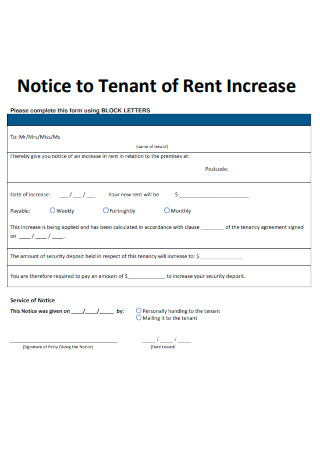
Notice to Tenant of Rent Increase
download now -
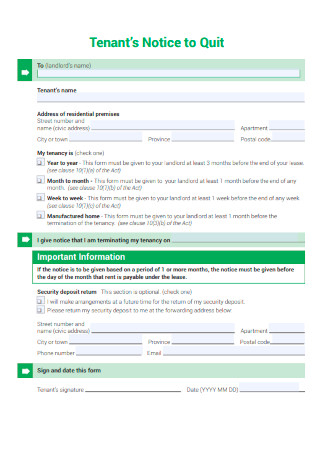
Tenant Notice to Quit
download now -
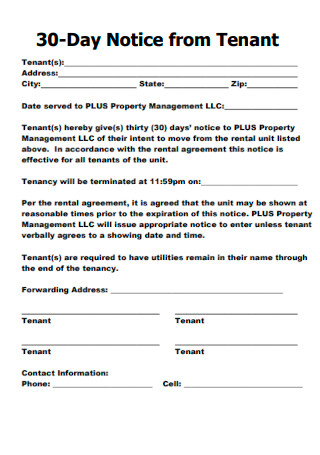
30 Day Notice from Tenant
download now -
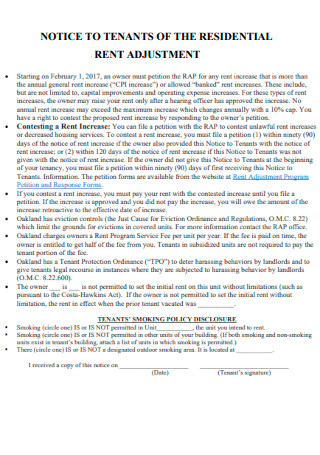
Notice to Tenants of the Residential Adjustment
download now -
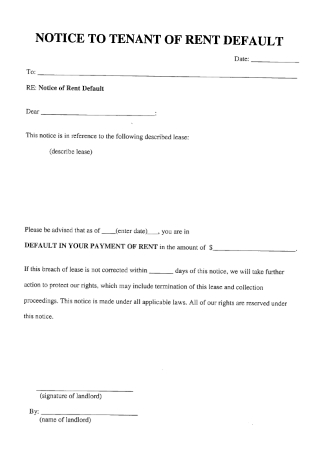
Notice to Tenant of Rent Default
download now -
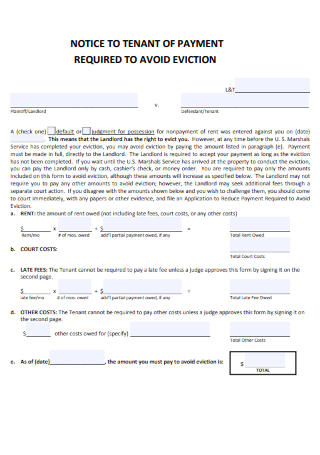
Notice to Tenant of Payment Required to Avoid Eviction
download now -
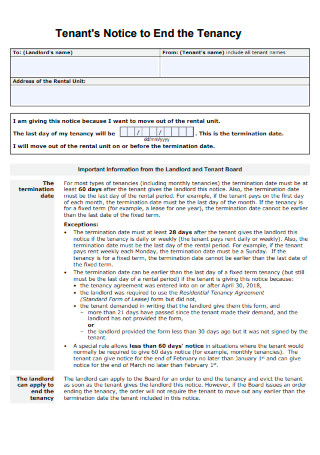
Tenants Notice to End the Tenancy
download now -
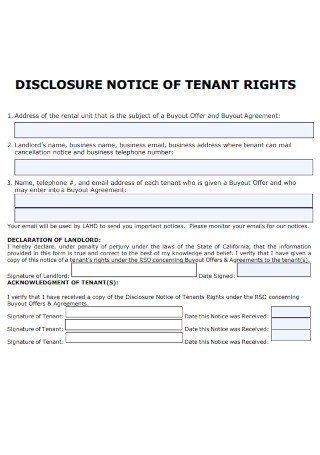
Disclosure Notice of Tenant Rights
download now -
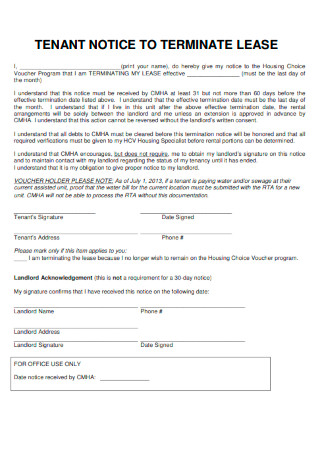
Tenant Notice to Terminate Lease
download now -
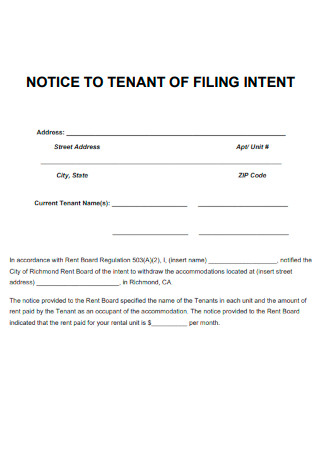
Notice to Tenant of Filing Intent
download now -
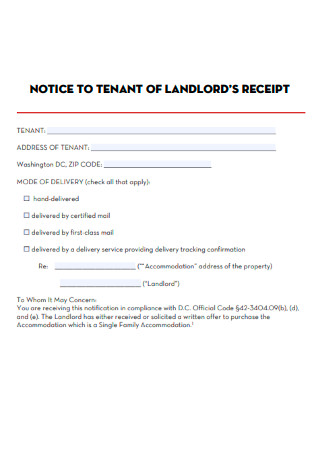
Notice to Tenant Landlords Receipt
download now -
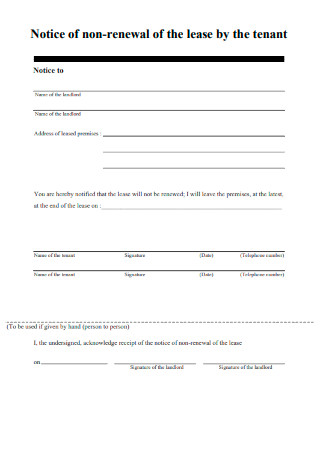
Notice of Non Renewal of the Lease by the Tenant
download now -
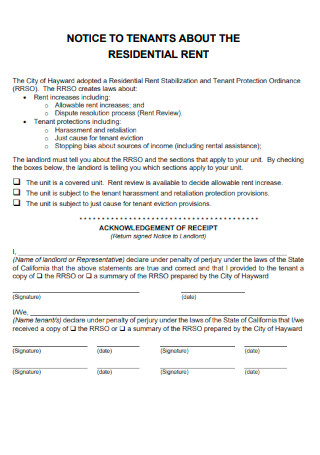
Notice to Tenant about the Residential Rent
download now -
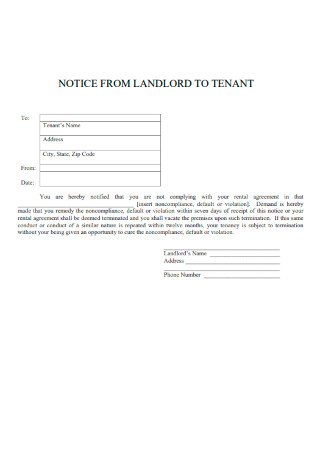
Notice from Landlord to Tenant
download now -
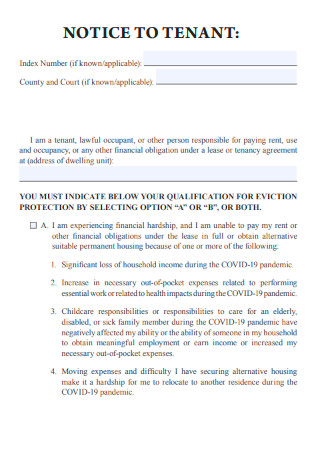
Basic Tenant Notice
download now -
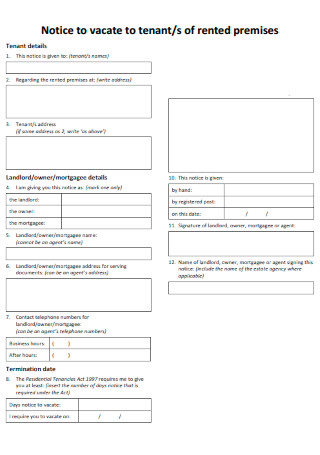
Notice to Vacate to Tenant of Rented Premises
download now -
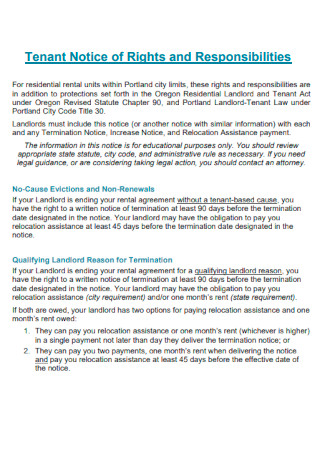
Tenant Notice of Rights and Responsibilities
download now -
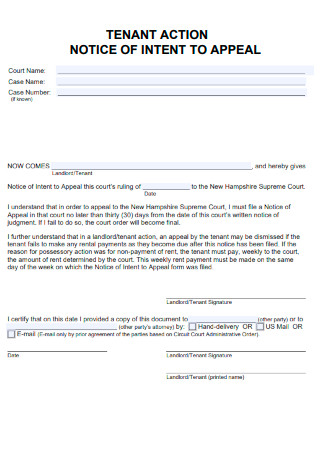
Tenant Action Notice of Intent to Appeal
download now -
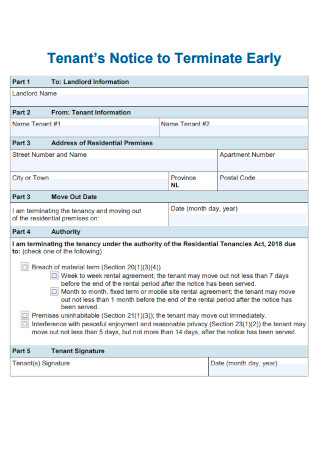
Tenants Notice to Terminate Early
download now -
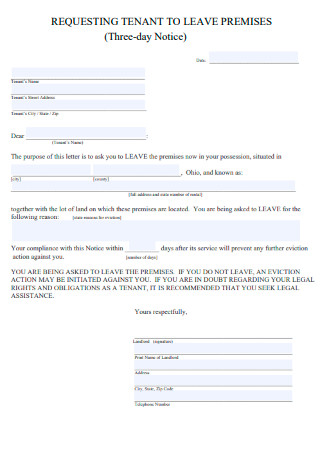
Requesting Tenant to Leave Premises 3 Day Notice
download now -
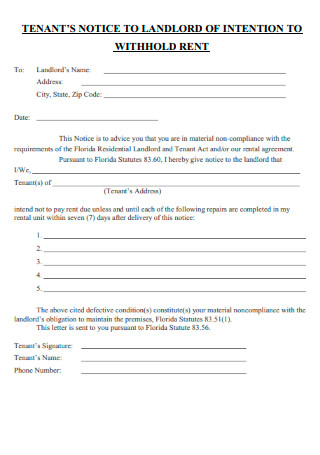
Tenants Notice to Landlord of Intention to Withhold Rent
download now
FREE Tenant Notice s to Download
20+ SAMPLE Tenant Notice
What Is Tenant Notice?
What Are the Landlord’s Legal Responsibilities?
When Should You Send a Tenant Notice and What Should You Expect?
Tips for Writing a Notice:
How To Write a Tenant Notice?
FAQs
Can a Tenant Deny Entry to a Landlord?
How Much Notice Do I Have to Give My Landlord Before I Move?
How Much Notice Does A Landlord Need To Give A Tenant To Move Out?
Can A Landlord Evict You If There Is No Lease?
Is A Landlord Responsible for Damaged Property?
Can My Landlord Force An Eviction By Turning Off The Utilities In My House?
Take note that there are rules and timelines that must be followed when ending a tenancy. A tenant, property manager or property owner can all issue a notice ending a tenancy. However, if the correct notice and form are not used, the other person may ask for compensation. Moreover, when serving notices by post, the sender must allow time for the mail to arrive when working out when a notice period ends.
What Is Tenant Notice?
Tenant Notices are used by the tenant to serve notice to the landlord in some circumstances, which allow the tenant and landlord to communicate effectively over lease terminations and repair requests. A notice is a written or printed announcement. It is written in order to inform a large number of people about something that has happened or is about to happen. It could be an upcoming event, competition, lost, and found notice or just a piece of information to be delivered to the targeted audience. It is generally written in a formal tone. Notices are factual and to-the-point. The language used is simple and formal, not flowery. They are put up on display boards in schools or in public places.
Notices are a means of formal communication targeted at a particular person or a group of persons. It is like a news item informing such person or persons of some important event. This can be an invitation to a meeting, an announcement of any event, to issue certain instructions, make appeals, and many more.
What Are the Landlord’s Legal Responsibilities?
A landlord’s legal responsibilities include, in almost every state, keeping the rental unit in a condition that is fit for habitation. Thus, they generally must make major repairs to problems that make the unit unlivable. They must fix environmental hazards or hazards that could cause accidents and injuries. A landlord also must take security precautions to reduce the risk of foreseeable crimes in or around the premises.
A landlord must respect the tenant’s right to privacy and generally provide notice before entering the apartment. They cannot discriminate against tenants based on their membership in a protected group, such as people of a certain race or national origin. Landlords also cannot retaliate against tenants for exercising a legal right, such as blowing the whistle on a building code violation. If they want to end the tenancy, they need to comply with state rules on notice, and they need to follow specific procedures if they want to evict a tenant.
When Should You Send a Tenant Notice and What Should You Expect?
The reason you are evicting a tenant will determine when you must send the tenant the notice to quit. In almost all cases, this notice must be served a minimum of three days before you are able to file for an eviction. Some reasons could require as much as a year’s notice.
Most of the time, you must first serve a tenant with a notice to cease before you can even serve them with a notice to quit. For instance, you may serve a tenant with a notice to cease if they are disrupting other tenants in the building. If they continue this behavior after receiving this notice to cease, you can then serve them with a notice to quit. It is important to wait for tenant response after serving a tenant notice. You will have to wait for one of two results:
Tips for Writing a Notice:
Here is a rundown of the Tenant Notice that we have found:
- Write the notice in a very precise manner and must add only relevant details. The word count of notice should not increase 50 words.
- Write sentences in the passive voice.
- Use formal language while writing a notice. It is a formal document and has to be written formally.
- Use very small and simple sentences that are very easy to understand. Writing in this way will help readers comprehend your information easily.
- Make sure you present your notice inbox style. This makes the presentation very good.
How To Write a Tenant Notice?
Since notices are a formal document, it should follow a structure or a format. Keep in mind there is no correct rigid format. Different formats used by different people or organizations can show some variations. However, it is ideal to follow a somewhat similar format for ease of understanding and uniformity. Let us look at the most used format of notices:
Step 1: Name of Issuing Organization or Authority
Right at the very top, you print the name of the person or company that is issuing the said notices. This will help the reader identify the notices as important or unimportant to him.
Step 2: Title
When writing notices, mention a title “NOTICE” at the top. This helps draw attention to the document. Notices are generally posted at a public place or published in newspapers. It is important that they do not get lost in a sea of information. So, a bold title clearly mentioned helps draw the attention.
Step 3: Provide a Date
After the tile to the left-hand side, print the date on which the notices have been published. Since this is a formal document date is an important aspect of it since these documents stay on record.
Step 4: Heading
Then we move on to an appropriate heading to the notices. This heading should make abundantly clear the purpose of the notices.
Step 5: Body
After the heading, we write the brief and to the point body of the notice. The main content of the notice features in the body.
Step 6: Writer’s Name
At the end of the notices, write the name and designation of the notice-writer. The notices have to also be signed by the same person to lend it authority and validity.
Step 7: Content Body of a Notice
Content in the notice body has to be very factual and must not contain any of the unnecessary details. Below are points mentioned that need to be covered in the notified body.
What—Clearly tell what notice is all about. Make sure to write very clearly and tell what event is it and what things have happened already. Try to write in a clear and un-ambiguous language.
Where—Give all the details where the event is going to be held. You must write the location details. Write everything very clearly and precisely.
When—Include the details of when some event is taking place. Keep in mind to mention the details of time so that people make their plans accordingly.
Who—The person or people to whom notices address must be written clearly. It is an important detail as it will help in removing the confusion.
Whom—The last thing you need to add in the notice is the contact details of the person that can be contacted in case of an emergency or any queries.
FAQs
Can a Tenant Deny Entry to a Landlord?
The landlord needs to provide notice if they need to enter the unit to make repairs or improvements, or if they are showing the apartment to a prospective tenant or purchaser. This notice needs to be reasonable and generally must be at least 24 to 48 hours in advance. Often, a tenant can deny entry to a landlord based on their right to privacy, although there are exceptions. A tenant cannot deny entry if there is an emergency that the landlord needs to address, if the tenant has abandoned the property, or, in some cases, if the police are responding to a crime.
How Much Notice Do I Have to Give My Landlord Before I Move?
Some leases and rental agreements have specific rules about the date on which a tenant can provide notice, so you should check to see whether this type of rule applies to you. You generally will need to provide 30 days’ notice to your landlord before you move. If you pay rent more often than once a month in a month-to-month tenancy, however, some states allow you to give a shorter period of notice that matches the interval at which you pay rent.
How Much Notice Does A Landlord Need To Give A Tenant To Move Out?
The notice that a landlord needs to give a tenant to move out depends on the reason behind the notice. If this is a simple termination of a lease or rental agreement that does not have a particular reason, such as a violation of the lease, the landlord usually needs to provide at least 30 days’ notice. This is true for both written leases and month-to-month tenancies. Some states require a somewhat longer period.
Can A Landlord Evict You If There Is No Lease?
Yes, a landlord can evict you if there is no lease. If there is no written lease, it is possible that you have an oral agreement based on a verbal understanding with the landlord. This oral agreement and its terms will be valid and enforceable if the lease period is one year or less. If there is no lease, either written or oral, a landlord still can evict you. This is because the lack of a lease means that you are in a month-to-month tenancy at will and must pay rent on a monthly basis, or more frequently if you have an agreement to that effect. However, a landlord generally must provide notice of terminating your tenancy.
Is A Landlord Responsible for Damaged Property?
A landlord sometimes may be liable for property damage or loss that was a foreseeable result of how they stored abandoned property, if the property has some objective value. A landlord is often responsible for damaged property. You would need to show that they created the condition that caused the property damage, such as by failing to make major repairs when needed. If you caused the condition that resulted in the property damage, however, the landlord will not be responsible. Specific rules apply to property that is left behind after a tenant moves out.
Can My Landlord Force An Eviction By Turning Off The Utilities In My House?
If your landlord wants to evict you in a lawful way, all applicable eviction procedures, which include sufficient notice and possibly a court judgment, must be followed. It is not legal for your landlord to force you out of a rental property by cutting off water, electricity, or other essential services. Your landlord is required to maintain your unit in a safe and habitable manner, and shutting off your utilities amounts to a constructive eviction.
A tenant notice to vacate is an important document that notifies of a desire to vacate the premises. It is normally illegal to make tenants move out of a property without a tenant notice to vacate. You may or may not have a reason for ending a lease with a tenant notice to vacate. You can give a notice to terminate without a reason or a notice to terminate with a reason. And when the tenant vacates, they might have left-behinds. Important documents and high-value goods should be kept safe for a set period of time. Rubbish and perishables can be disposed of immediately even without the tenant’s consent. Keep in mind to always check your local laws to know the requirements on how to handle tenant’s left-behinds. If you’re not sure what to do, consult with a real estate lawyer.
